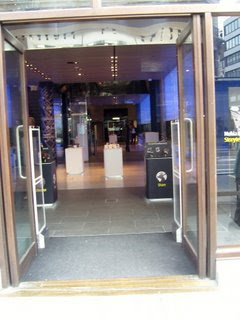The computer on board the lunar module that put Neil Armstrong on the moon in 1969 had less computing power than today’s toasters – just 64kb of memory and a clock speed of 0.05Mhz. That’s a far cry from the processing power delivered by our SPARC M7 chip. Learn more about our ground-breaking new technology: visit http://bit.ly/1NLBOYG
Friday, 8 January 2016
IT Fun Facts #1 Neil Armstrong – one small computer for one giant leap.
The computer on board the lunar module that put Neil Armstrong on the moon in 1969 had less computing power than today’s toasters – just 64kb of memory and a clock speed of 0.05Mhz. That’s a far cry from the processing power delivered by our SPARC M7 chip. Learn more about our ground-breaking new technology: visit http://bit.ly/1NLBOYG
Friday, 11 September 2015
Monday, 29 April 2013
Friday, 23 November 2012
Oracle @ Storage Expo in the Netherlands
Storage Expo is an annual exhibition that brings together leading manufacturers of Data Storage Systems for 2 days in Utrecht, the Netherlands. More than 2,000 participants had the opportunity to know in loco the real benefits of Oracle Storage solutions and not only! The original Oracle booth decoration aroused enormous attention and served as the theme for countless conversations about how Oracle helps customers deal with the growing volume of data they face every day.
Friday, 16 November 2012
Tuesday, 28 February 2012
Thursday, 15 July 2010
The New Consumer Behavior
The consumer nowadays talks openly and publicly about your company and can influence your brand positively or negatively.
A practical example from this article: HP debuts first competence center in Portugal.
Comment on the news from a reader:
"HP should invest instead in a technical assistance center ... I had a problem with a pc and they gave me a number for technical assistance in Spain?? but then I bought the pc in Portugal? And then they shared by phone an absurd amount of money to resolve the issue without even knowing well what the problem was. HP NEVER AGAIN THANK YOU "
Question: is your company aware of the new consumer behavior? Are you doing something to address these online interactions with your brand? Well...you should.
A practical example from this article: HP debuts first competence center in Portugal.
Comment on the news from a reader:
"HP should invest instead in a technical assistance center ... I had a problem with a pc and they gave me a number for technical assistance in Spain?? but then I bought the pc in Portugal? And then they shared by phone an absurd amount of money to resolve the issue without even knowing well what the problem was. HP NEVER AGAIN THANK YOU "
Question: is your company aware of the new consumer behavior? Are you doing something to address these online interactions with your brand? Well...you should.
Tuesday, 9 February 2010
Sun Ray @ Cabo Verde
The reduction of CO2 emissions and the need to save energy are hot topics nowadays. But we must move from words to actions. Just look at this example from an electric company in Cape Verde, in the forefront of eco-efficient technology solutions adoption. An example to follow!
Thursday, 23 July 2009
Friday, 3 July 2009
Thursday, 16 April 2009
In the News
Today we have a major TV news channel interviewing employees on how our company motivates the team. Easy answers :-)
Monday, 15 December 2008
Thursday, 23 October 2008
Tuesday, 7 October 2008
Start me up!

Are you a young entrepreneur or know someone with an entrepreneurial spirit?
You want to grow but have limited economic resources?
You recognize that in times of crisis, you can not sit and wait for the turbulence to pass?
Then sign up to Sun Startup Essentials program and take advantage of discounts up to 65% in ICT solutions. For example: A server equipped with AMD Opteron or Intel Xeon processors from just 572 Euros!
And never stop!
You want to grow but have limited economic resources?
You recognize that in times of crisis, you can not sit and wait for the turbulence to pass?
Then sign up to Sun Startup Essentials program and take advantage of discounts up to 65% in ICT solutions. For example: A server equipped with AMD Opteron or Intel Xeon processors from just 572 Euros!
And never stop!
Wednesday, 30 July 2008
A day in the life of a supercomputer
One of the most powerful supercomputers in Portugal, installed at the University of Coimbra. Excellent video from Exame magazine.
Monday, 28 July 2008
Sun is in

LinkedIn is currently the largest professional network worldwide with over 25 million registered professionals. Today LinkedIn announced that is supported by a combination of hardware, software and Open Source technologies from Sun Microsystems, including the MySQL database, the Solaris operating system and Sun SPARC servers. An example for companies on the so-called Web 2.0. Long live the simplicity and innovation.
Thursday, 5 June 2008
A question of ethics

What happened a few years ago with American energy company Enron has served as an example to companies about the need to run their business to high standards of transparency and professional ethics. When someone asks me "what characteristic do you most admire in Sun Microsystems?", two words instantly come to my mind: transparency and ethics. To corroborate this statement, Ethisphere magazine released a list of the most ethical companies in the world. Sun was recognized in the category "Computer Hardware" alongside Cisco and Xerox.
Monday, 28 April 2008
The collective "Wow" effect
Last week I felt the "Wow" effect together with customers and press. We visited the first portable data center in the world! Housed in a portable container, the data center can be transported to anywhere on the planet! So far it has been known as "Project Blackbox," but the official name is Sun Modular Datacenter. Here are a few pics.







Thursday, 10 April 2008
The "Wow" effect
On my last trip to San Francisco, I had the chance to visit an Apple store. Down the hill I could already see the metallic-colored building with a huge apple. Inside, hundreds of people experiencing tens of products on display. I notice the huge line for to the cashier. At that time, the first iPhone was not yet on sale but Apple was still selling like crazy.
In a meeting last week in Madrid, I noticed that 4 of my 10 colleagues had the new iPhone. What explains this phenomenon? I call it the "Wow" effect. My Nokia phone supports 3G, Wi-Fi, email, etc. It's perfect! It is my mobile office and I cannot live without it. But it's not an iPhone. It lacks the "Wow" effect. The "Wow" effect happens, for example, when we see this demo video of the iPhone. Just compare this video to the one of the closest competitor on the Nokia website, which is only the largest manufacturer of mobile phones in the world. Another example is what tells us John Dodds, in his excellent blog Make Marketing History. Two photos of the main entrance of the Apple and Nokia stores in London. Can you find out what is the photo of the Nokia store and which one is Apple? If you do, say Wooow!


Friday, 23 November 2007
Java User Group de Portugal - Do Sonho à Realidade


Há cerca de 3 anos, 3 empresas e a vontade de algumas pessoas que aí trabalhavam fez nascer o www.java.pt, o ponto de encontro da comunidade Java em Portugal. Infelizmente, o site nunca correspondeu às expectativas da comunidade Java nacional. É fácil perceber porquê. As pessoas não se identificavam com o projecto, faltava-lhe o conceito de "comunidade", tinha um ar demasiado "empresarial", etc. Inconformados com a situação, em finais de Agosto reuniu-se um grupo de profissionais de Java oriundos de Lisboa e Porto e decidiram relançar a ideia do Java User Group nacional. Muito foi feito nestes últimos 5 meses e muito há ainda a fazer, nomeadamente pôr no ar o novo site. Enquanto o sítio não fica pronto, a inscrição no PT.JUG pode ser feita através de um grupo que foi criado no Google Groups. O grupo é o ptjug-geral. Pelo que já vi nos últimos dias, a comunidade Java em Portugal vai mostrar ao mundo do que é capaz. Apenas posso dizer que arrepia ver tanta gente, com tanta vontade. As inscrições estão abertas e são gratuitas, claro. :-) E o que dizer do logo do PT.JUG?! Eu adoro!
Thursday, 22 November 2007
Prémios Sociedade da Informação em Portugal
A APDSI (Associação para a Promoção e Desenvolvimento da Sociedade de Informação), a Sun Microsystems, a Oracle e o Jornal Expresso promoveram esta semana a cerimónia de atribuição do “Prémio Personalidade do Ano da Sociedade da Informação em 2007”.
O Galardoado este ano foi José Tribolet, Professor Catedrático do IST e Presidente da Direcção do Instituto de Engenharia de Sistemas e Computadores (INESC) pelo contributo para o desenvolvimento da Sociedade da Informação e do Conhecimento em Portugal.

A selecção foi efectuada por um Júri, formado por sete pessoas de reconhecido mérito e idoneidade, com a seguinte composição:
- J. Dias Coelho, Presidente da APDSI, que presidiu;
- Francisco Maria Balsemão, Administrador da Impresa;
- Francisco Murteira Nabo, Presidente da GALP;
- Gustavo Cardoso, Professor Universitário;
- João Taron de Oliveira, Director-Geral da Oracle Portugal;
- Jorge Salamanca, Director-Geral da Sun Microsystems Portugal;
- Luís Magalhães, Presidente da UMIC.
António João Simões Monteiro, homenageado a título póstumo, desde cedo dedicou a sua vida à defesa da Engenharia Informática em Portugal, tarefa que iniciou com a criação da Associação Portuguesa de Informática. Era docente da Faculdade de Ciências e Tecnologia da Universidade Nova de Lisboa, sócio fundador e Director-Geral da Associação para a Promoção e Desenvolvimento da Sociedade da Informação (APDSI). Era o Presidente da Amnistia Internacional Portugal, organização de defesa dos direitos humanos que, em 1981, ajudou a fundar. Foi coordenador do 1º Congresso Português da Informática, em 1980 e foi membro da Missão para Sociedade da Informação.- Francisco Maria Balsemão, Administrador da Impresa;
- Francisco Murteira Nabo, Presidente da GALP;
- Gustavo Cardoso, Professor Universitário;
- João Taron de Oliveira, Director-Geral da Oracle Portugal;
- Jorge Salamanca, Director-Geral da Sun Microsystems Portugal;
- Luís Magalhães, Presidente da UMIC.
Procedeu-se ainda à atribuição do Prémio Editorial que pretende reconhecer, distinguir e estimular a publicação de trabalhos na imprensa inscrita portuguesa ao longo do ano. Este ano os vencedores foram:
- Nuno Almeida, Revista Exame, com o artigo "Factura Digital";
- Luísa Dâmaso, Semana Informática, com o artigo "Informatização Hospitalar".

Monday, 19 November 2007
Subscribe to:
Posts (Atom)







.JPG)
.JPG)
.JPG)
.JPG)
.JPG)
.JPG)
.JPG)
.JPG)
.JPG)


















